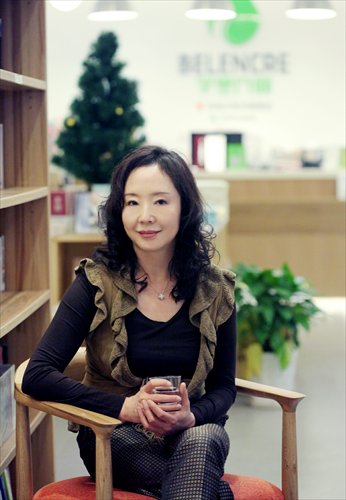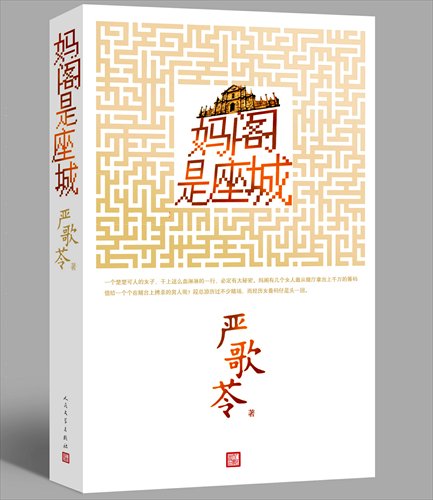Gambling on love


Yan Geling and her new book. Photos: Courtesy of People's Literature Publishing House.
Yan Geling, one of the most influential female American Chinese writers today, is also one of the few who is both prolific and keeps quality high. Her last novel Prisoner Lu Yanshi was published in 2011, and then adapted by director Zhang Yimou into his upcoming film Return. This year Yan released her latest novel, Mage is a City.
Born in Shanghai, Yan is also a well-known scriptwriter behind many hit screen works such as Little Aunt Tatsuru (2008), A Woman's Epic (2009) and The Flowers of War (2011). In her previous works, she was acclaimed for her vivid portrayals of female characters.
The protagonist in her new book is again a woman, but this time the heroine's life is removed from the day-to-day life of common people.
She is a tout and loan shark who preys on gamblers in Macao, an image to most only from the big screen.
Lost city
The story begins in Mage, an area near the A-Ma Temple in Macao. Mei Xiao'ou, the main character in the novel, lives on kickbacks she gets from bringing gamblers to casinos.
She makes even more money by providing high-interest loans to gamblers when their luck runs out.
Years of vicissitudes have sharpened her sophistication with her customers. She also maintains complicated relationships with three men, all with gambling problems.
"The reason I wrote about this subject is that I was inspired by the lifestyles of some very rich people I've met. I couldn't help constantly wondering why some people would risk their family and livelihood just for gambling," Yan told the Global Times. "The novel is my observations on their lives."
Choosing Mei as the leading character also allows the author to slip in her thoughts on gambling from the viewpoint of a female observer.
"However, in the book Mei is not totally an outsider, she also gambles," said Yan. "In casinos she is gambling like those gamblers. Lending money to people she thought might have the luck to earn the money back is also a gamble. In life, she is gambling her love with three different gamblers."
Mei marries her first love Lu Jintong, who used to have a decent job at a national scientific research institution, but later became a hopeless gambler. Mei took her son and left Lu.
Subsequently in Mage, Mei meets Shi Qilan, a wood carving artist, and Duan Kaiwen, a very rich real estate developer from the Chinese mainland.
Under Mei's prodding, both Shi and Duan fell into gambling, losing all their wealth and becoming buried in deep debt.
Unlike Duan, who is mired in obstinacy and greed, Shi finally stops gambling and leaves Mage.
Mage is not just a city, it's a lost city, and Yan depicts the lunacy of these gamblers as well as people who live off them like Mei.
"To experience the mentality of those fervent gamblers, I personally went to Macao several times to gamble, and met several of those female touts there," said Yan.
Redeemed by love
Observing these characters develop, readers can feel from the beginning that the author has doomed their fate. Mei's former husband Lu died from cancer. Duan was sent back to the police in the mainland and prohibited from entering Macao for life.
And Mei also got her comeuppance - her son falls to gambling in the end.
Famous Chinese female writer Eileen Chang (1920-95) was also very keen on observing people's humanity in her works, but generally her characters' lives end in tragedy. Unlike Chang, Yan still leaves some warmth and hope for her characters.
In Mage is a City, Mei finally moves to Vancouver, Canada, with her son, who decides to quit gambling and study at university.
In Vancouver, Mei meets Shi, her love from Mage, but this time they decide to keep a distance from each other and hide their feelings deep in their hearts, for the sake of each other's quiet life and their families.
"Whatever I wrote, it all comes down to the power of love in the end," said Yan. In this novel, despite the straightforward exposure and criticism of people's greed and materialism, the author emphasizes the emotional journey of Mei.
Ultimately it is a story about her love for her son and for Shi being redeemed after her dark and insidious life in Mage.
Look at the dark side
Mage is a City is Yan's first Chinese novel reflecting the evil side of current society in China. Her new novel rides the recent popularity of novels on topical themes set in the present by famous writers. Since last year, writers including Su Tong, Yan Lianke and Yu Hua have released long novels to reflect today's social reality.
However, none of these books received the positive acclaim that the authors' previous works did. For example, Yu Hua's latest work The Seventh Day met with sharp criticism from readers who said it simply rounded up information about hot social incidents in recent years like forced demolitions and food safety scandals.
"The approach of topical subjects is not wrong in writing. The key lies in how to express them and how a writer defines his literature style," said Yan. According to her, Mage is a City is just a start for her writing about current society.
"Current society is experiencing a transformation. It is full of temptations, and very magic. No subject is more magic than those occurrences in Chinese cities," she said.
Yan's novels are often a favorite for directors for adaptation. Works like Little Aunt Tatsuru, A Woman's Epic, Tielihua, and the most famous, The Flowers of War, have been adapted as movies or TV works.
This time, according the People's Literature Publishing House which is the publisher of Yan's new work, the screen copyright of Mage is a City was sold even before the book was released.
"The importance of Yan lies in her keen insight that lets her penetrate humanity," said Meng Fanhua, a cultural critic. "Those characters she pens cannot be simply judged as good or bad people, but readers can feel sympathetic to them after reading their stories."
However, despite being favored by film and TV directors, Yan's novels now are also accused by some critics of being written for the screen.
"As a literature lover, I would prefer for Yan to write something that is not so suitable for adaptation, pure literature that she is totally capable of writing," said Zhang Lixian, a famous publisher and critic.